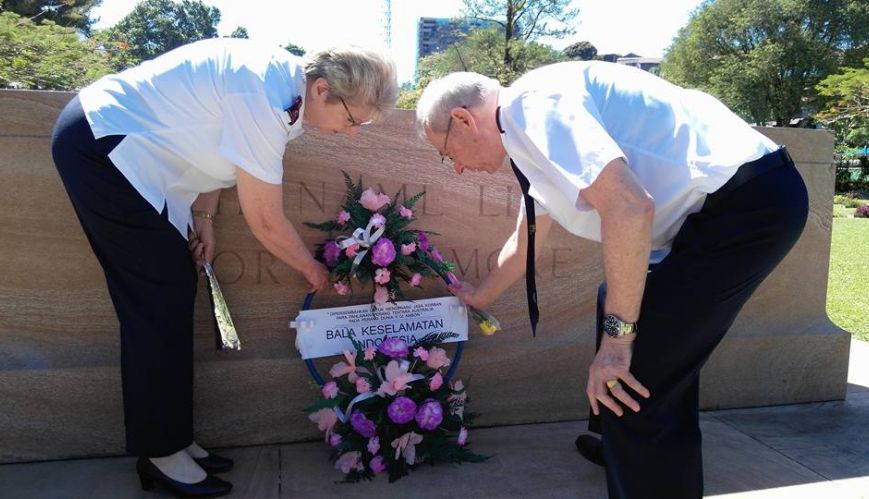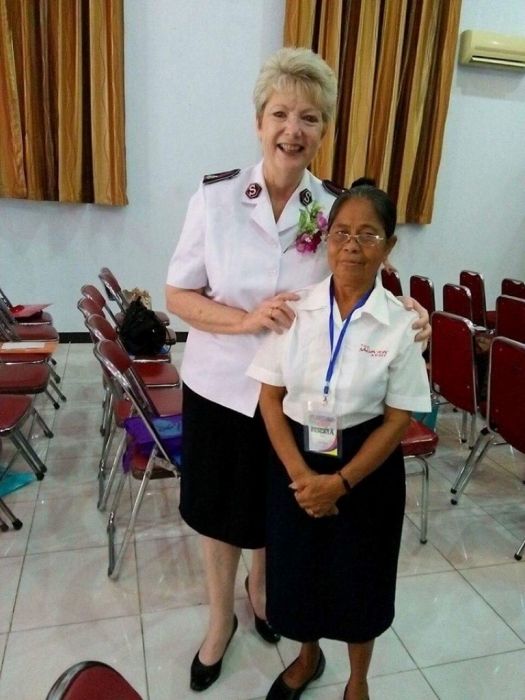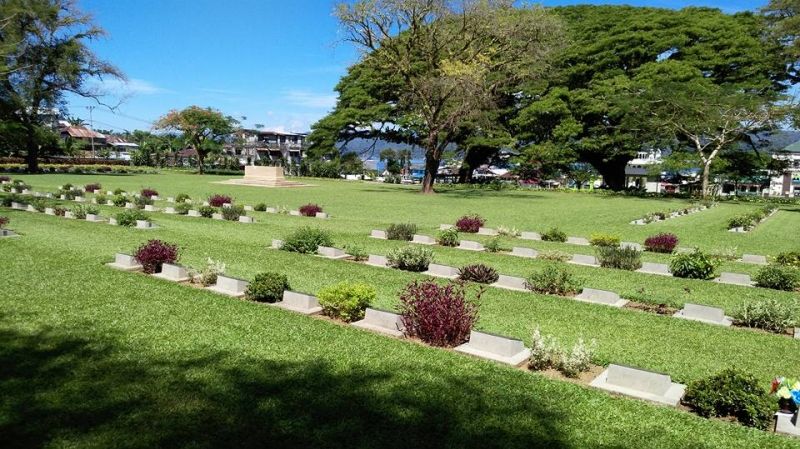Indonesian island's close connection to Salvation Army

Indonesian island's close connection to Salvation Army
Commissioners Jennifer and Peter Walker lay a wreath at the Australian War Cemetery in Ambon, Indonesia, as part of their recent visit to the island.
Australian Officer, Commissioner Jennifer Walker, Territorial President of Women’s Ministries, Indonesia Territory, shares two experiences from 2017 that have made a deep impact on her – one woman’s personal testimony, and the discovery of war graves of Australian Salvationists.
At the end of October, we made our first visit to the island of Ambon. Ambon is a very beautiful tropical island with rolling hills and is surrounded by crystal-blue ocean. It was colonised by the Portuguese in 1526 and then came under Dutch control in 1609.
We were surprised to discover that the population is predominantly Christian and there are a number of very large churches on the island. The Salvation Army operates a large medical clinic and corps there.
From 1999 to 2001 there was a fierce civil war in Ambon between the Christians and Muslims. Over 5000 people were killed, half a million people were displaced and many Christian churches and houses were burned.
I travelled to Ambon three days before Peter [Commissioner Peter Walker, Territorial Commander, Indonesia Territory] with the Women’s Ministries team from Territorial Headquarters, to conduct a regional Women’s Ministries camp and rally. Women who attended these events had travelled from the islands of Papua, Buru, Seram and South Sulawesi.
Amazing testimony
Meet Nonce (pronounced Nun-cha) – a very small lady from West Papua.
Nonce grew up in South Sulawesi and came from the Bugis Tribe – a strong cultural and religious group in that area. She became well versed in the Koran and in fact became a teacher of the Koran to the women in her tribe.
 Nonce with Commissioner Jennifer Walker.
Nonce with Commissioner Jennifer Walker.
Nonce married a Christian man, but he converted to Islam when they married. About six years after her marriage, Jesus appeared to her in a vision, but she ignored this and refused to acknowledge the reality of it. It happened again on two subsequent occasions and on the third time she saw Jesus’ hands and heard him say “I am the way and the truth”. At this point she felt compelled to acknowledge Jesus in her life.
However, the decision to follow Jesus came at an incredible cost and Nonce endured intense opposition and persecution from her tribe who were very angry with her. They threw stones at her house, repeatedly threatened to kill her, and threatened to bury her body in the ground leaving her head open to the elements.
On one occasion they dragged her from her house and beat her around the head. As the men were beating her she prayed, “Father forgive them because they don’t know what they are doing”. Thinking she was going to die she prayed, “Lord I am yours!”.
During all the threats and opposition, Nonce declared that she was not afraid to die for her faith and asked God not to leave her alone. The first time she entered a church with her husband, who also converted back to Christianity, she wept and prayed “Lord raise me up!”.
We witnessed an amazing small woman with a giant faith in God who refused to be deterred by opposition. Nonce now lives in West Papua and in 2002 became a soldier of The Salvation Army.
She confessed that God had been her strength, she had received many blessings through the church and she would never turn back from following Jesus.
Australian Salvationists
Unbeknown to Peter and I, there is a close connection between Ambon and Australia. During World War Two, Australia suffered the highest per capita death rate of any Japanese war camp on this island.
Of the 1131 soldiers who came to the island, only 352 survived. Over 252 were massacred by Japanese soldiers and the majority died while captive in the prison camp. The prisoners died at a rate of three per day from disease, malnourishment and mistreatment.

While we were there the local officers arranged for us to visit the Australian War Cemetery where we laid a flower wreath and had a short ceremony. It was a special moment. There were two very large trees at the cemetery, with hundreds of small birds and butterflies flying around them. The surrounds were peaceful and we felt as if we were standing on holy ground. We sensed the presence of God in that moment.
Since our visit to the Australian war cemetery in Ambon we have discovered that there were Australian Salvationists who served in the armed forces there – Herbert Sedgewick (whose son, John, is a soldier at the Camberwell Corps, Melbourne) is buried in the cemetery; and Charlie Woodward from the Gold Coast Temple Corps.